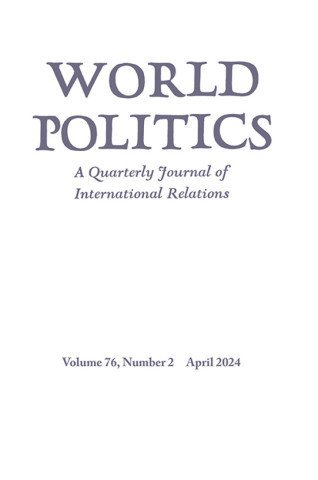技术变革与国际体系
IF 2.5
1区 社会学
Q1 INTERNATIONAL RELATIONS
引用次数: 10
摘要
世界政治会影响新技术的采用吗?各国绝大多数依赖于国外发明的技术,它们对技术使用强度的不同导致了它们在经济发展方面的许多差异。许多关于技术采用的文献都侧重于国内情况。作者认为,国际体系的结构至关重要,因为它影响国家之间的竞争水平,而竞争水平反过来又影响领导人制定加速技术采用的政策的意愿。各国采用新技术是为了避免容易受到其他国家的攻击或胁迫。通过系统地考察过去200年各国采用技术的情况,作者发现,当国际体系集中度较低时,各国采用新技术的速度会更快,系统集中度的变化对技术采用具有暂时的因果效应,而政府促进技术采用的政策与对日益激烈的国际竞争的担忧有关。竞争性的国际制度是技术变革的重要诱因,可能成为全球技术浪潮的基础。本文章由计算机程序翻译,如有差异,请以英文原文为准。
Technological Change and the International System
ABSTRACT Do world politics affect the adoption of new technology? States overwhelmingly rely on technology invented abroad, and their differential intensity of technology use accounts for many of their differences in economic development. Much of the literature on technology adoption focuses on domestic conditions. The authors argue instead that the structure of the international system is critical because it affects the level of competition among states, which in turn affects leaders’ willingness to enact policies that speed technology adoption. Countries adopt new technology as they seek to avoid being vulnerable to attack or coercion by other countries. By systematically examining states’ adoption of technology over the past two hundred years, the authors find that countries adopt new technologies faster when the international system is less concentrated, that changes in systemic concentration have a temporally causal effect on technology adoption, and that government policies to promote technology adoption are related to concerns about rising international competition. A competitive international system is an important incentive for technological change and may underlie global technology waves.
求助全文
通过发布文献求助,成功后即可免费获取论文全文。
去求助
来源期刊

World Politics
Multiple-
CiteScore
8.40
自引率
0.00%
发文量
24
期刊介绍:
World Politics, founded in 1948, is an internationally renowned quarterly journal of political science published in both print and online versions. Open to contributions by scholars, World Politics invites submission of research articles that make theoretical and empirical contributions to the literature, review articles, and research notes bearing on problems in international relations and comparative politics. The journal does not publish articles on current affairs, policy pieces, or narratives of a journalistic nature. Articles submitted for consideration are unsolicited, except for review articles, which are usually commissioned. Published for the Princeton Institute for International and Regional Affairs
 求助内容:
求助内容: 应助结果提醒方式:
应助结果提醒方式:


